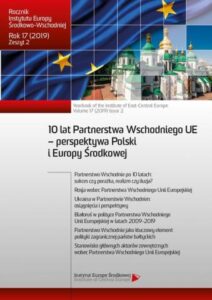ORCID: Bogdan Borowik: 0000-0002-3118-2340
Pages: 197-225
Edition: Lublin 2019
DOI: https://doi.org/10.36874/RIESW.2019.2.8
Citation method: B. Borowik, Partnerstwo Wschodnie na łamach polskich dzienników i tygodników opinii (2009-2019), „Rocznik Instytutu Europy Środkowo-Wschodniej” 17 (2019), z. 2, s. 197-225, DOI: https://doi.org/10.36874/RIESW.2019.2.8.
Keywords: Eastern Partnership, opinion-forming press in Poland
Abstract:
The article deals with the image of the Eastern Partnership in the Polish opinion-forming press in the years 2009–2019. The aim of the Partnership was to strengthen the stability of the states to the east of the borders of the European Union, and thus to reduce the threats appearing in this region, which was equivalent to increasing the security of the EU itself. The article presents the results of a qualitative analysis of research material in the form of press texts published in two national daily newspapers (Gazeta Wyborcza and Rzeczpospolita) and two opinion weeklies (Newsweek Polska and Polityka). The main criterion for constructing the image of the Eastern Partnership in the opinion-forming press were the most important players participating in the Partnership’s programme, i.e. the European Union and Ukraine. The third separate entity was Russia, as an opponent of the European initiative. Another criterion of analysis was to indicate the assumptions of the programme, their implementation and results in the context of each of the parties mentioned. The analysed articles often presented opinions and assessments of representatives of non-governmental organisations, experts from analytical centres and politicians connected with the Partnership. The assumptions and activities of the European Union were generally positively evaluated in the articles, while the opinions were definitely negative concerning Russia’s activities. Concerning the opinions on the activities of state entities invited to the Eastern Partnership programme, these were partly positive, depending on the country and the period evaluated. Particularly much attention was paid to Ukraine in the articles. It should be stressed that, most often, the opinion-forming press wrote about the Eastern Partnership on the occasion of successive summit meetings of representatives of European Union institutions, Member States and the Eastern Partnership.
Bibliography:
Banasik M., Wojna hybrydowa i jej konsekwencje dla bezpieczeństwa euroatlantyckiego, Warszawa 2018.
Bednarczyk J. i in., Wizja rozwoju Partnerstwa Wschodniego po 2020 roku, Raport Polskiego Instytutu Spraw Międzynarodowych, Warszawa, marzec 2019.
Cianciara A. K., Partnerstwo Wschodnie 2009-2014. Geneza, funkcjonowanie, uwarunkowania, Warszawa 2014.
Dobek-Ostrowska B., Polski system medialny na rozdrożu, Wrocław 2011.
Grzybczak J., Czasopisma i ich wydawcy, [w:] Polski system medialny 1989-2011, red. K. Ignatowicz-Pokorna, Kraków 2013.
Instytut Monitorowania Mediów, www.imm.com.pl/Konopka J., Ogólnopolska prasa codzienna po 1989 roku, [w:] Polski system medialny 1989-2011, red. K. Ignatowicz-Pokorna, Kraków 2013.
Mielczarek T., Tygodniki opinii w zmieniającej się rzeczywistości, Kraków 2018.
Partnerstwo Wschodnie na łamach polskich dzienników i tygodników opinii (2009-2019)
Partnerstwo Wschodnie, www.consilium.europa.eu/pl/policies/eastern-partnership/
Piskorska B., Polityka wschodnia Unii Europejskiej – wyzwania dla Polski, [w:] Polska w Unii Europejskiej. Nowe wyzwania, red. L. Barcz i in., Warszawa 2018.
Piskorska B., Soft power w polityce UE wobec państw Partnerstwa Wschodniego, Lublin 2017.
Wojna hybrydowa Rosji przeciwko Ukrainie w latach 2014-2016, red. W. Baluk, M. Doroszko, Lublin 2017.

PDF: Download